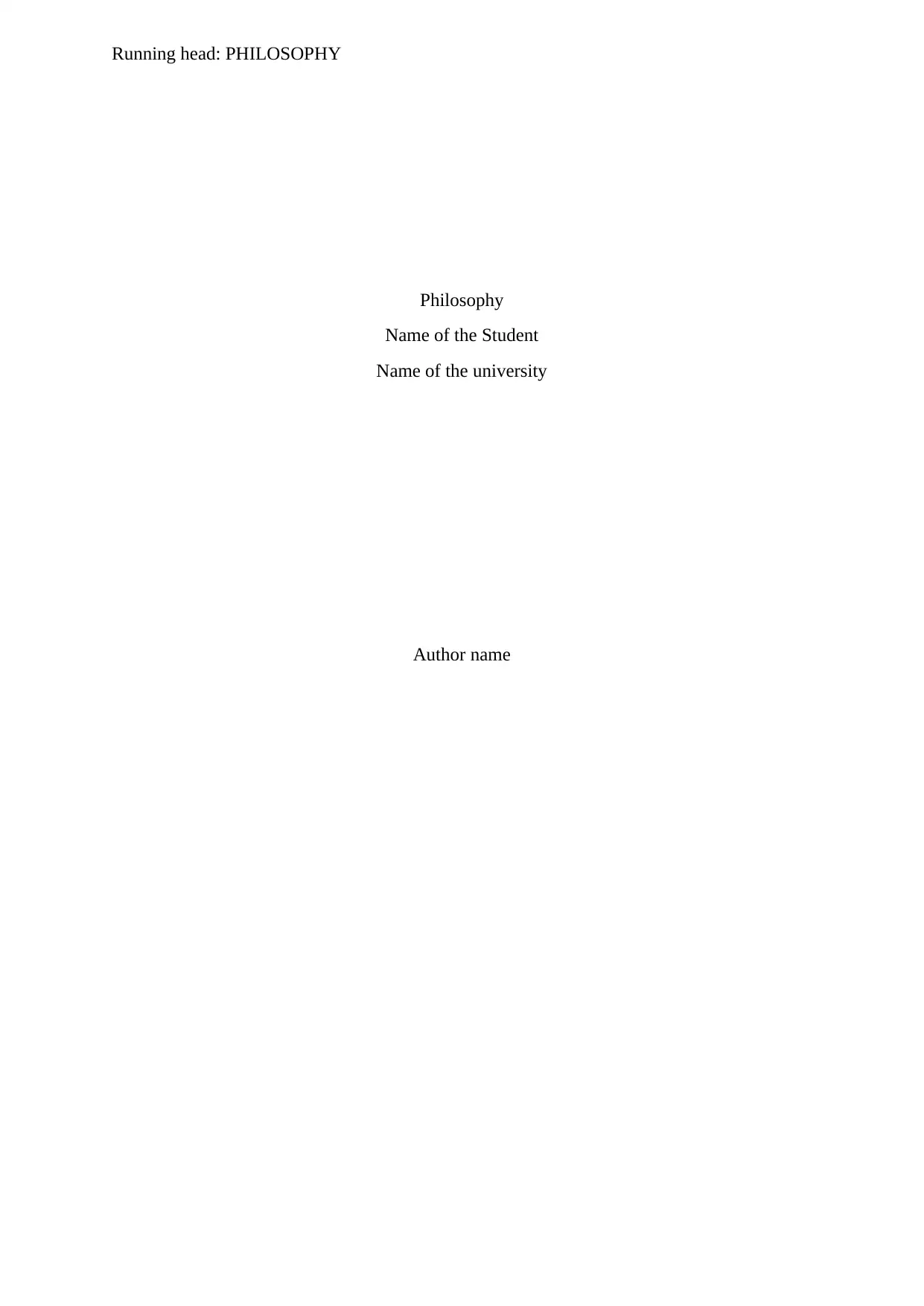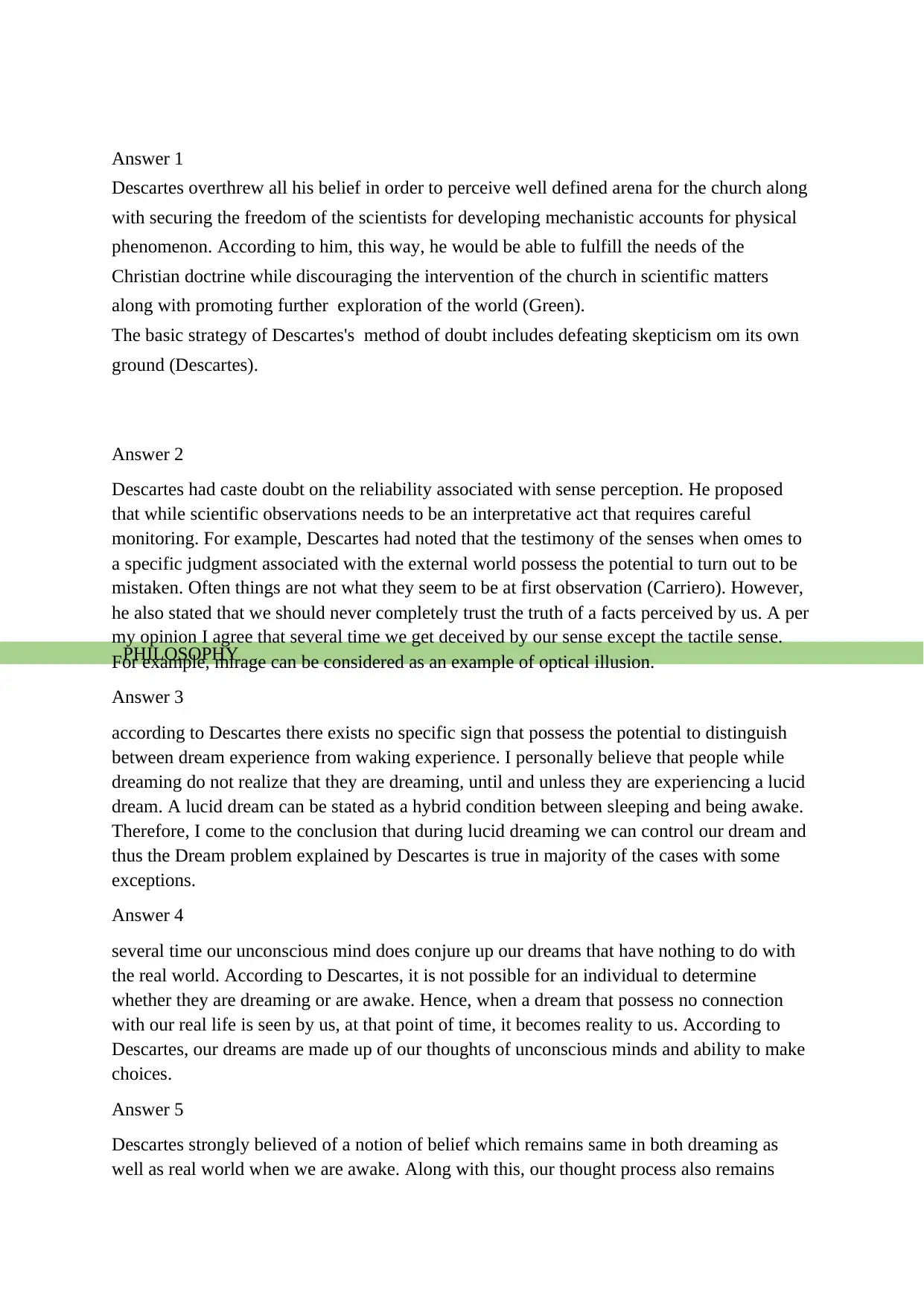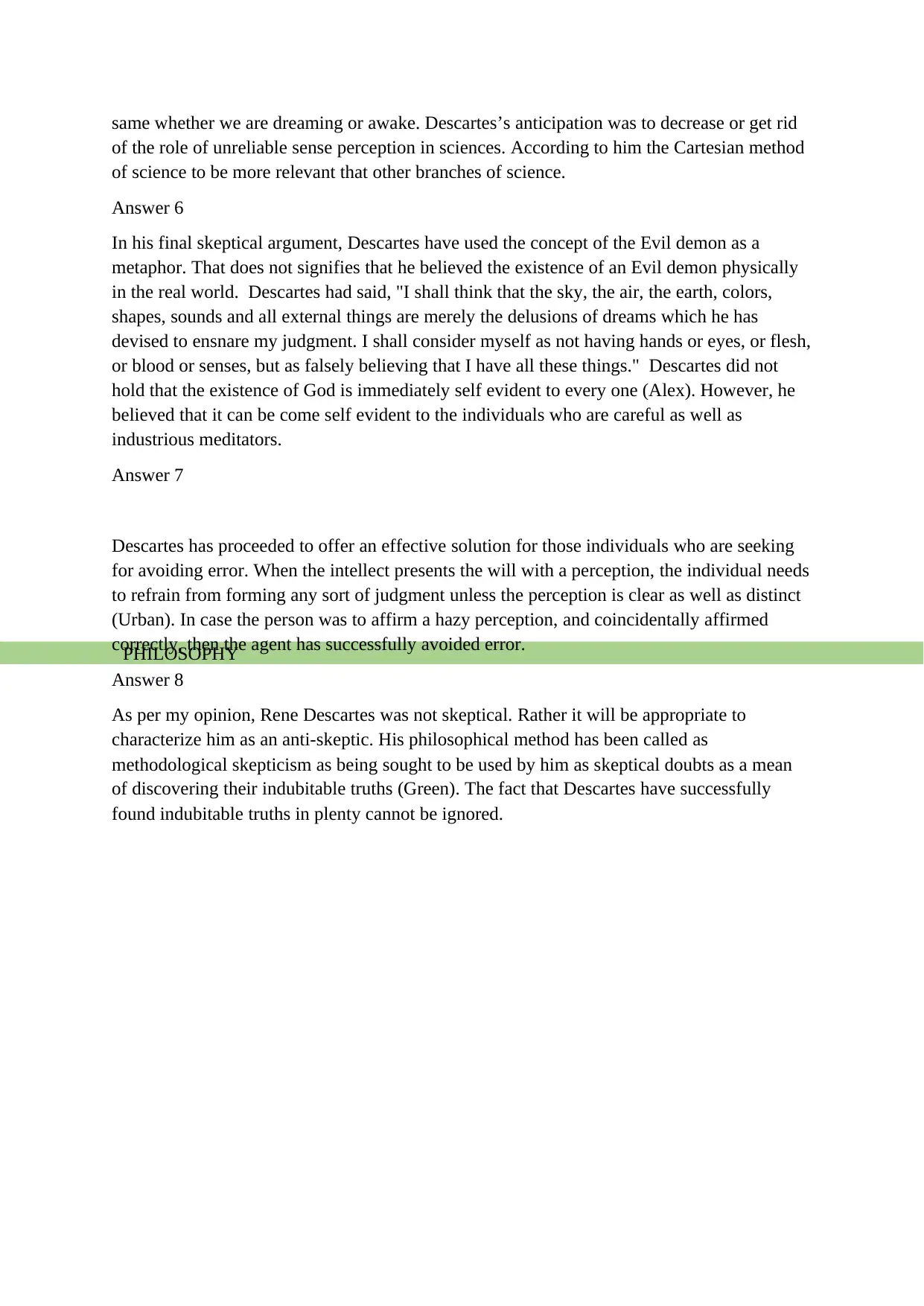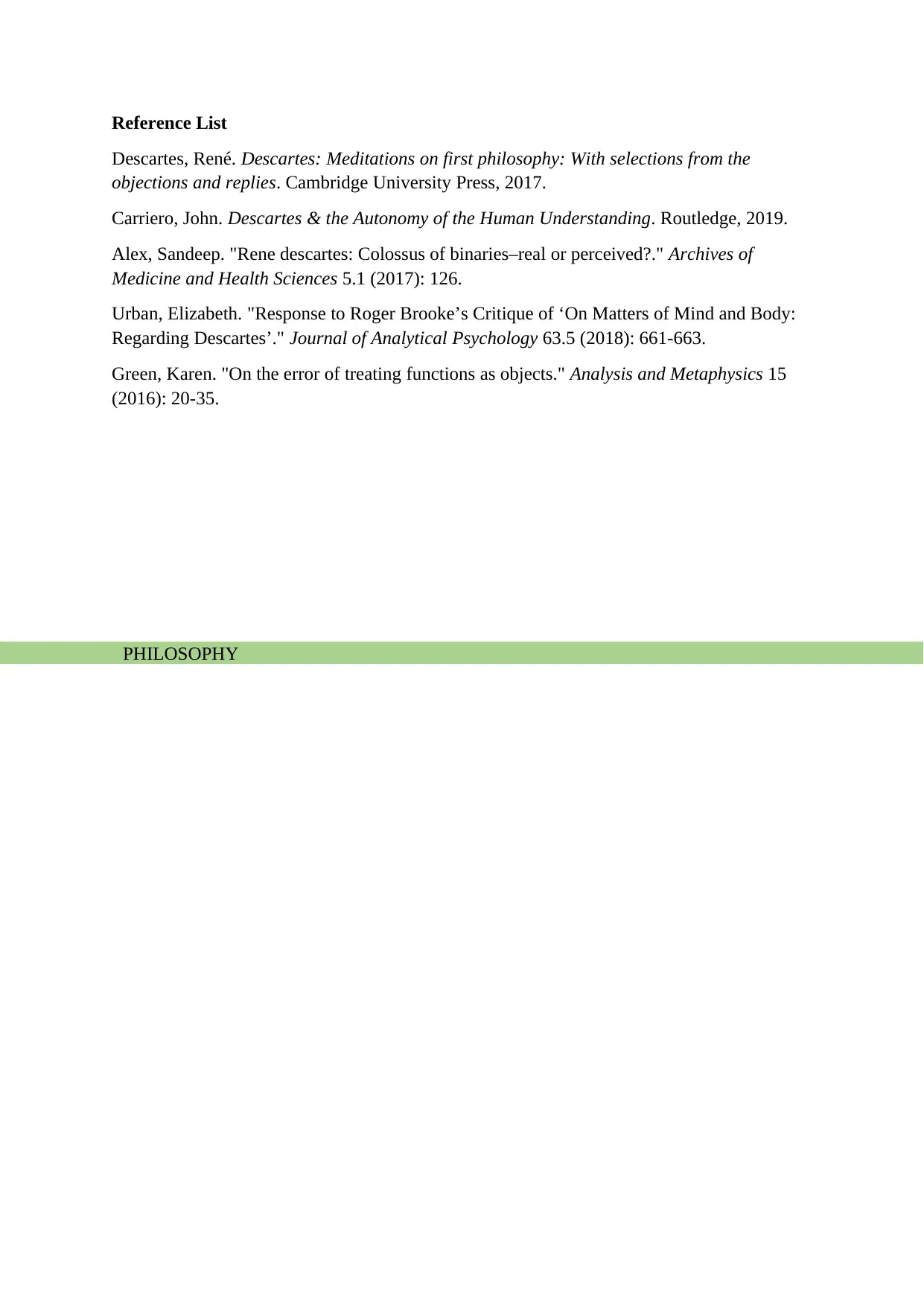Philosophy Assignment: Descartes's Skepticism and Dreams
VerifiedAdded on 2022/08/27
|4
|963
|17
Homework Assignment
AI Summary
This assignment explores René Descartes's philosophical ideas, focusing on his method of doubt and skepticism. The student answers questions about Descartes's reasons for questioning his beliefs, his views on sense perception, and his arguments regarding dreams and reality. The assignment ...

Running head: PHILOSOPHY
Philosophy
Name of the Student
Name of the university
Author name
Philosophy
Name of the Student
Name of the university
Author name
Paraphrase This Document
Need a fresh take? Get an instant paraphrase of this document with our AI Paraphraser

PHILOSOPHY
Answer 1
Descartes overthrew all his belief in order to perceive well defined arena for the church along
with securing the freedom of the scientists for developing mechanistic accounts for physical
phenomenon. According to him, this way, he would be able to fulfill the needs of the
Christian doctrine while discouraging the intervention of the church in scientific matters
along with promoting further exploration of the world (Green).
The basic strategy of Descartes's method of doubt includes defeating skepticism om its own
ground (Descartes).
Answer 2
Descartes had caste doubt on the reliability associated with sense perception. He proposed
that while scientific observations needs to be an interpretative act that requires careful
monitoring. For example, Descartes had noted that the testimony of the senses when omes to
a specific judgment associated with the external world possess the potential to turn out to be
mistaken. Often things are not what they seem to be at first observation (Carriero). However,
he also stated that we should never completely trust the truth of a facts perceived by us. A per
my opinion I agree that several time we get deceived by our sense except the tactile sense.
For example, mirage can be considered as an example of optical illusion.
Answer 3
according to Descartes there exists no specific sign that possess the potential to distinguish
between dream experience from waking experience. I personally believe that people while
dreaming do not realize that they are dreaming, until and unless they are experiencing a lucid
dream. A lucid dream can be stated as a hybrid condition between sleeping and being awake.
Therefore, I come to the conclusion that during lucid dreaming we can control our dream and
thus the Dream problem explained by Descartes is true in majority of the cases with some
exceptions.
Answer 4
several time our unconscious mind does conjure up our dreams that have nothing to do with
the real world. According to Descartes, it is not possible for an individual to determine
whether they are dreaming or are awake. Hence, when a dream that possess no connection
with our real life is seen by us, at that point of time, it becomes reality to us. According to
Descartes, our dreams are made up of our thoughts of unconscious minds and ability to make
choices.
Answer 5
Descartes strongly believed of a notion of belief which remains same in both dreaming as
well as real world when we are awake. Along with this, our thought process also remains
Answer 1
Descartes overthrew all his belief in order to perceive well defined arena for the church along
with securing the freedom of the scientists for developing mechanistic accounts for physical
phenomenon. According to him, this way, he would be able to fulfill the needs of the
Christian doctrine while discouraging the intervention of the church in scientific matters
along with promoting further exploration of the world (Green).
The basic strategy of Descartes's method of doubt includes defeating skepticism om its own
ground (Descartes).
Answer 2
Descartes had caste doubt on the reliability associated with sense perception. He proposed
that while scientific observations needs to be an interpretative act that requires careful
monitoring. For example, Descartes had noted that the testimony of the senses when omes to
a specific judgment associated with the external world possess the potential to turn out to be
mistaken. Often things are not what they seem to be at first observation (Carriero). However,
he also stated that we should never completely trust the truth of a facts perceived by us. A per
my opinion I agree that several time we get deceived by our sense except the tactile sense.
For example, mirage can be considered as an example of optical illusion.
Answer 3
according to Descartes there exists no specific sign that possess the potential to distinguish
between dream experience from waking experience. I personally believe that people while
dreaming do not realize that they are dreaming, until and unless they are experiencing a lucid
dream. A lucid dream can be stated as a hybrid condition between sleeping and being awake.
Therefore, I come to the conclusion that during lucid dreaming we can control our dream and
thus the Dream problem explained by Descartes is true in majority of the cases with some
exceptions.
Answer 4
several time our unconscious mind does conjure up our dreams that have nothing to do with
the real world. According to Descartes, it is not possible for an individual to determine
whether they are dreaming or are awake. Hence, when a dream that possess no connection
with our real life is seen by us, at that point of time, it becomes reality to us. According to
Descartes, our dreams are made up of our thoughts of unconscious minds and ability to make
choices.
Answer 5
Descartes strongly believed of a notion of belief which remains same in both dreaming as
well as real world when we are awake. Along with this, our thought process also remains

PHILOSOPHY
same whether we are dreaming or awake. Descartes’s anticipation was to decrease or get rid
of the role of unreliable sense perception in sciences. According to him the Cartesian method
of science to be more relevant that other branches of science.
Answer 6
In his final skeptical argument, Descartes have used the concept of the Evil demon as a
metaphor. That does not signifies that he believed the existence of an Evil demon physically
in the real world. Descartes had said, "I shall think that the sky, the air, the earth, colors,
shapes, sounds and all external things are merely the delusions of dreams which he has
devised to ensnare my judgment. I shall consider myself as not having hands or eyes, or flesh,
or blood or senses, but as falsely believing that I have all these things." Descartes did not
hold that the existence of God is immediately self evident to every one (Alex). However, he
believed that it can be come self evident to the individuals who are careful as well as
industrious meditators.
Answer 7
Descartes has proceeded to offer an effective solution for those individuals who are seeking
for avoiding error. When the intellect presents the will with a perception, the individual needs
to refrain from forming any sort of judgment unless the perception is clear as well as distinct
(Urban). In case the person was to affirm a hazy perception, and coincidentally affirmed
correctly, then the agent has successfully avoided error.
Answer 8
As per my opinion, Rene Descartes was not skeptical. Rather it will be appropriate to
characterize him as an anti-skeptic. His philosophical method has been called as
methodological skepticism as being sought to be used by him as skeptical doubts as a mean
of discovering their indubitable truths (Green). The fact that Descartes have successfully
found indubitable truths in plenty cannot be ignored.
same whether we are dreaming or awake. Descartes’s anticipation was to decrease or get rid
of the role of unreliable sense perception in sciences. According to him the Cartesian method
of science to be more relevant that other branches of science.
Answer 6
In his final skeptical argument, Descartes have used the concept of the Evil demon as a
metaphor. That does not signifies that he believed the existence of an Evil demon physically
in the real world. Descartes had said, "I shall think that the sky, the air, the earth, colors,
shapes, sounds and all external things are merely the delusions of dreams which he has
devised to ensnare my judgment. I shall consider myself as not having hands or eyes, or flesh,
or blood or senses, but as falsely believing that I have all these things." Descartes did not
hold that the existence of God is immediately self evident to every one (Alex). However, he
believed that it can be come self evident to the individuals who are careful as well as
industrious meditators.
Answer 7
Descartes has proceeded to offer an effective solution for those individuals who are seeking
for avoiding error. When the intellect presents the will with a perception, the individual needs
to refrain from forming any sort of judgment unless the perception is clear as well as distinct
(Urban). In case the person was to affirm a hazy perception, and coincidentally affirmed
correctly, then the agent has successfully avoided error.
Answer 8
As per my opinion, Rene Descartes was not skeptical. Rather it will be appropriate to
characterize him as an anti-skeptic. His philosophical method has been called as
methodological skepticism as being sought to be used by him as skeptical doubts as a mean
of discovering their indubitable truths (Green). The fact that Descartes have successfully
found indubitable truths in plenty cannot be ignored.
⊘ This is a preview!⊘
Do you want full access?
Subscribe today to unlock all pages.

Trusted by 1+ million students worldwide

PHILOSOPHY
Reference List
Descartes, René. Descartes: Meditations on first philosophy: With selections from the
objections and replies. Cambridge University Press, 2017.
Carriero, John. Descartes & the Autonomy of the Human Understanding. Routledge, 2019.
Alex, Sandeep. "Rene descartes: Colossus of binaries–real or perceived?." Archives of
Medicine and Health Sciences 5.1 (2017): 126.
Urban, Elizabeth. "Response to Roger Brooke’s Critique of ‘On Matters of Mind and Body:
Regarding Descartes’." Journal of Analytical Psychology 63.5 (2018): 661-663.
Green, Karen. "On the error of treating functions as objects." Analysis and Metaphysics 15
(2016): 20-35.
Reference List
Descartes, René. Descartes: Meditations on first philosophy: With selections from the
objections and replies. Cambridge University Press, 2017.
Carriero, John. Descartes & the Autonomy of the Human Understanding. Routledge, 2019.
Alex, Sandeep. "Rene descartes: Colossus of binaries–real or perceived?." Archives of
Medicine and Health Sciences 5.1 (2017): 126.
Urban, Elizabeth. "Response to Roger Brooke’s Critique of ‘On Matters of Mind and Body:
Regarding Descartes’." Journal of Analytical Psychology 63.5 (2018): 661-663.
Green, Karen. "On the error of treating functions as objects." Analysis and Metaphysics 15
(2016): 20-35.
1 out of 4
Your All-in-One AI-Powered Toolkit for Academic Success.
+13062052269
info@desklib.com
Available 24*7 on WhatsApp / Email
![[object Object]](/_next/static/media/star-bottom.7253800d.svg)
Unlock your academic potential
© 2024 | Zucol Services PVT LTD | All rights reserved.

